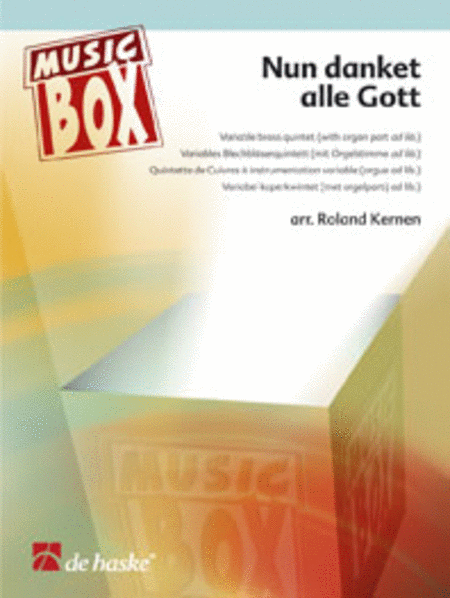Nun danket alle Gott
-
Ships in 2 to 3 weeks
Details
Description
SKU: BT.DHP-1063977-070
Composed by Johann Sebastian Bach. Arranged by Roland Kernen. Music Box. Set (Score & Parts). Composed 2006. 12 pages. De Haske Publications #DHP 1063977-070. Published by De Haske Publications (BT.DHP-1063977-070).9x12 inches. English-German-French-Dutch.
The melody of the chorale Nun danket alle Gott (Now Thank We All Our God) was originally written in 1636 by the German clergyman and musician Martin Rinckart . Its international fame is due to the fact that in 1725 Johann Sebastian Bach based his cantata Gott, der Herr, ist Sonn’ und Schild (BWV 79) on this melody. The five-part arrangement by Roland Kernen that lies before you is suitable for a variable brass line-up. After a short introduction, the chorale follows, first in four-part harmony, and later with an added counterpart. A middle section, which sounds refreshing and rhythmic because of the time changes and articulation used, finally leads to a repeat of thechorale with an agile upper part. This arrangement also contains an organ part ad libitum.
De melodie van het koraal Nun danket alle Gott (Now Thank We All Our God/Dankt, dankt nu allen God) werd oorspronkelijk in de eerste helft van de zeventiende eeuw geschreven. De internationale bekendheid ervan is tedanken aan het feit dat Johann Sebastian Bach in 1725 zijn cantate Gott, der Herr, ist Sonn’ und Schild (BWV 79) op deze melodie baseerde. De bewerking van Roland Kernen voor een variabele koperbezetting is voorzien van eenorgelpartij ad libitum.
Sir Hubert Parry (1848-1918) vertonte ein Gedicht aus dem Vorwort der Gedichtsammlung Milton von William Blake. Seit der Orchesterbearbeitung von Sir Edward Elgar ist es eine beliebte nationale Hymne, die heute traditionell die Last Night of the Proms“ in der Londoner Albert Hall beschließt. Der Text spielt die Überlieferung an, die besagt, dass Jesus in seiner Jugend mit Joseph aus Arimathia nach Britannien kam. Philip Sparke machte die traditionsreiche, würdevolle Musik dem Blasorchester zugänglich.
La mélodie originale de l’hymne chrétienne Nun danket alle Gott (Remercions tous notre Seigneur) est datée de la première moitié du XVIIe siècle. Elle deviendra mondialement célèbre en 1725, lorsque Jean-Sébastien Bach s’en inspire pour composer la Cantate BWV 79 Gott, der Herr, ist Sonn’ und Schild. Cet arrangement pour Quintette de Cuivres contient également une partie pour orgue ad. lib.Instrumentation : 2 Trompettes Sib, Cor en Fa/Mib, Trombone/ Euphonium en Ut BC ou Trombone/Euphonium Sib TC,Tuba en Ut BC ou Basse Mib TC ou Euphonium/Basse Sib TC, Orgue ad lib.
La melodia della corale Nun danket alle Gott fu scritta nel XVII secolo e deve la sua notoriet al fatto che Johann Sebastian Bach la utlizzò come base della sua cantata Gott, der Herr, ist Sonn’ und Schild (BWV 79). L’arrangiamento di Roland Kernen è pensato per un quintetto di ottoni a strumentazione variabile. La parte dell’organo, è opzionale (inclusa al libro).

 Share
Share